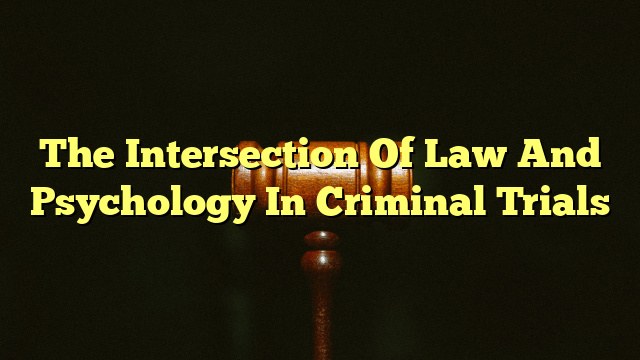Table of Contents
- What is the Intersection of Psychology and the Law?
- Where do Psychology and the Legal System Intersect?
- How Would You Characterize the Relationship between Psychology and Law Enforcement?
- What is the Relationship between Criminology and Psychology?
What is the Intersection of Psychology and the Law?
The intersection of psychology and the law deals with the use of psychological principles and practices in the legal system. This includes a variety of tasks, such as evaluating a person’s competency to stand trial, examining the truth of a witness’s testimony, or determining a defendant’s mental state at the time of a crime. In many legal cases, mental health professionals can provide unique insights that may be helpful in understanding the facts surrounding the case.
In the criminal justice system, psychology and the law intersect in a variety of ways. For example, mental health professionals can be called upon to evaluate a defendant’s competency to stand trial or to assess the reliability of a witness’s testimony. Additionally, mental health professionals may be asked to evaluate a defendant’s mental state at the time of an alleged offense, or to provide an opinion on whether a particular punishment or sentence is appropriate for a particular defendant.
Where do Psychology and the Legal System Intersect?
Psychology and the legal system intersect in a variety of ways, including when mental health professionals are called upon to evaluate a defendant’s competency to stand trial or to assess the reliability of a witness’s testimony. Additionally, mental health professionals may be asked to evaluate a defendant’s mental state at the time of an alleged offense, or to provide an opinion on whether a particular punishment or sentence is appropriate for a particular defendant.
Psychology and the legal system also intersect in other ways, such as in the area of criminal profiling. In this process, mental health professionals use their knowledge of psychology and human behavior to try to identify an individual who may have committed a particular crime. Additionally, mental health professionals may be called upon to assess a person’s mental capacity in civil cases, such as those involving personal injury or wrongful death.
How Would You Characterize the Relationship between Psychology and Law Enforcement?
The relationship between psychology and law enforcement is one of collaboration and mutual respect. Law enforcement officers may turn to mental health professionals for help in understanding a suspect’s mental state or to assist in developing a criminal profile. In turn, mental health professionals may turn to law enforcement officers for help in gathering information or to provide insight into criminal behavior.
The relationship between psychology and law enforcement is one of mutual benefit, as both disciplines are able to learn from and benefit from the expertise of the other. By working together, both fields can ensure that justice is served and that the truth of a situation is accurately revealed.
What is the Relationship between Criminology and Psychology?
The relationship between criminology and psychology is a complex one. Criminology is the study of criminal behavior, while psychology is the study of the mind and behavior. While the fields are distinct, they are both closely related.
Criminologists often rely on psychological research to inform their studies of criminal behavior. For example, psychologists may study the relationship between mental illness and criminal behavior, which can help criminologists better understand why certain offenders commit certain types of crimes. Additionally, psychologists may study the effects of trauma on criminal behavior, which can provide important insights into the motivations and thought processes of criminal offenders.
Psychologists, meanwhile, often rely on criminological research to understand why people commit crimes. By studying the motivations and thought processes of criminals, psychologists can develop more effective treatments for those who have committed criminal acts. Additionally, psychologists can use criminological research to gain a better understanding of the social and environmental factors that contribute to criminal behavior.
In conclusion, the intersection of psychology and the law is a complex and multifaceted area of study. Mental health professionals can provide unique insights into a variety of legal cases

